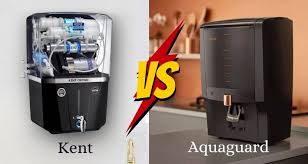Kent RO vs Aquaguard is one of the most commonly debated topics. Both brands have earned a reputation for offering high-quality water purification systems, but they cater to different needs and water conditions.
Kent RO is renowned for its advanced Reverse Osmosis (RO) technology, ideal for areas with high Total Dissolved Solids (TDS) in the water, effectively removing dissolved salts, chemicals, and other contaminants. On the other hand, Aquaguard employs a combination of UV, UF, and RO technologies to cater to both urban and rural water sources.
Table of Contents
Understanding Kent RO and Aquaguard
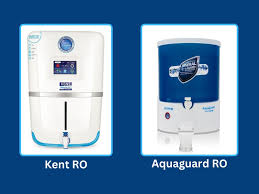
Both Kent RO and Aquaguard are among the top water purifiers in the market, known for their advanced technologies and reliability. Kent RO focuses on Reverse Osmosis (RO) technology to purify water, while Aquaguard combines various filtration methods like UV, UF, and RO depending on the model.
The main difference lies in their approach to water filtration: Kent RO targets more complex impurities like heavy metals, while Aquaguard offers models suited to both urban and rural water sources. Both brands aim to provide clean, safe drinking water but use different technologies to achieve this.
The filtration technologies used by both brands focus on removing contaminants and ensuring mineral retention for healthy drinking water. Comparing Kent RO vs Aquaguard, each has its unique strengths in catering to specific water conditions.
Features of Aquaguard
Aquaguard is another leading brand offering a variety of water purifiers with different technologies, including UV, UF, and RO systems. The Aquaguard models such as Aquaguard Marvel and Aquaguard Geneus are designed for various water qualities, making them suitable for both urban and rural use. Aquaguard’s UV technology is beneficial in killing harmful bacteria and viruses, whereas its RO technology addresses dissolved impurities.
In terms of reliability, Kent vs Aquaguard can be seen in terms of their use cases: Aquaguard works well for areas with water that has biological contamination, while Kent RO is more suitable for water with high levels of dissolved solids. Users frequently appreciate Aquaguard’s design and ease of use but have mixed opinions on its maintenance costs.

Kent RO vs Aquaguard: Comparison of Filtration Technologies
When comparing Kent RO vs Aquaguard, the filtration technologies used in each brand make a significant difference. Kent RO primarily relies on Reverse Osmosis, which effectively removes dissolved solids, chemicals, and salts, making it a superior choice for areas with high TDS (Total Dissolved Solids).
In contrast, Aquaguard uses a mix of UV, UF, and RO technologies, depending on the model, to ensure water is safe to drink. Kent vs Aquaguard which is better depends largely on water conditions: if your water has high levels of contamination and TDS, Kent RO would be a more effective choice.
Aquaguard, however, excels in areas where biological contaminants like bacteria and viruses are the primary concern. Both brands provide excellent filtration, but the decision comes down to specific needs and water quality.
Performance and Effectiveness of Kent RO
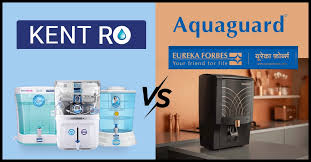
Kent RO is known for its high performance in purifying water. The Kent RO system is effective in removing harmful chemicals, bacteria, and viruses from water, providing safe drinking water. One of the key benefits of Kent is its Mineral RO technology, which ensures that essential minerals like calcium and magnesium are not stripped away during filtration.
In addition to purifying water, Kent RO also improves the taste and odor, which is often a concern with tap water. International users, especially those in regions like Kent or Canada, benefit from Kent’s reliable and efficient purification systems that can handle varying water quality.
Many customer reviews highlight the effectiveness of Kent RO in treating water with high TDS levels and providing healthier, mineral-rich water. However, it’s important to keep in mind that maintenance costs can be a consideration for some users.
Performance and Effectiveness of Aquaguard
Aquaguard performs exceptionally well in regions with water contamination caused by microorganisms. Its UV and UF technologies provide excellent protection against viruses and bacteria. Aquaguard’s RO models are also efficient at removing harmful dissolved solids, but it doesn’t always match Kent RO in TDS removal.
Aquaguard models like Genius and Marvel offer the flexibility of adapting filtration methods based on the water source, ensuring it’s always effective. When comparing Kent vs Aquaguard, Aquaguard generally performs better in areas where biological contamination is the main issue, while Kent RO shines when dealing with chemical and dissolved solid contamination. Which is best Kent or Aquaguard depends on your water’s specific impurities: Aquaguard excels in rural areas with microbial issues, while Kent is a strong contender for urban areas with high TDS levels.
Which is Better for Hard Water: Kent RO or Aquaguard?

Hard water is a common issue, especially in urban areas with high levels of calcium and magnesium. Both Kent RO vs Aquaguard offer solutions to address hard water, but Kent RO is particularly effective in purifying hard water due to its powerful Reverse Osmosis technology. RO systems remove dissolved solids, including calcium and magnesium, which are responsible for hardness.
In comparison, Aquaguard also offers models that handle hard water, but its filtration is generally not as aggressive as Kent RO when it comes to hardness. For tackling hard water issues, Kent RO provides a more effective solution, removing not just harmful chemicals but also hardness-causing minerals.
If you live in an area with hard water, Kent RO vs Aquaguard RO will likely see Kent RO as the more efficient option for overall purification.
Price Comparison: Kent RO vs Aquaguard
Pricing is an important factor when deciding between Kent RO vs Aquaguard. Kent RO is generally priced higher due to its advanced technology, such as Mineral RO, and its higher TDS handling capacity. However, it offers value for money with its efficient filtration and long-term durability.
On the other hand, Aquaguard offers more budget-friendly options with a range of models that cater to different water types. While the upfront cost of Aquaguard is lower, Kent RO often justifies its higher price with advanced features, including the ability to remove higher amounts of dissolved solids.
In terms of value for money, it comes down to the specific needs and water quality: if you need robust filtration, Kent RO might be a better investment, but if you’re on a budget, Aquaguard offers excellent filtration at a lower cost.
Durability and Maintenance
When it comes to durability, both Kent RO vs Aquaguard are built to last, but there are some differences. Kent RO water purifiers are known for their strong build quality and long-lasting performance. However, they require more frequent maintenance, particularly with filter replacements and membrane cleaning.
On the other hand, Aquaguard purifiers, especially those that use UV and UF technologies, tend to be less maintenance-intensive. Kent RO vs Aquaguard for durability and longevity is a close comparison, but Kent RO might require more attention over the years. After-sales service is another area where Kent vs Aquaguard can differ, with Kent offering a more extensive network but potentially higher repair costs.
Customers often report satisfaction with both brands but note that the overall maintenance cost of Kent RO is generally higher compared to Aquaguard.
Customer Reviews and Satisfaction
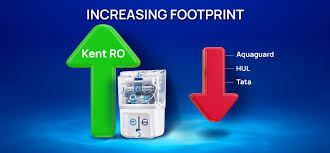
Customer feedback for both Kent RO and Aquaguard is generally positive, though with some differences in preference. Many customers appreciate Kent RO for its advanced filtration technology and the ability to handle high TDS levels. Reviews often highlight Kent water reviews with praise for the taste of water post-filtration and the convenience of automated systems.
Aquaguard users, however, often mention its affordability and good performance in removing biological contaminants. While both brands have their loyal user base, when comparing Kent vs Aquaguard, it’s clear that Kent RO is preferred by users who have specific filtration needs, such as high TDS water. Aquaguard has a broader appeal due to its affordability and simpler filtration systems, making it popular for general water purification needs.
Installation and Ease of Use
Both Kent RO and Aquaguard are relatively easy to install, though Kent RO systems may require professional assistance for setup, especially for larger models. Kent RO offers a more complex filtration system, which might require a slightly more involved installation process. Aquaguard, on the other hand, offers more plug-and-play models, especially for smaller units.
In terms of Kent vs Aquaguard, both are user-friendly once installed, but Aquaguard might be easier for DIY enthusiasts. Most models from both brands come with user-friendly controls and clear instructions for operation, making them suitable for people with varying levels of technical expertise.
Installation times vary, but on average, Aquaguard models are quicker to install than Kent RO systems, which may require additional setup for their advanced filtration.
Warranty and After-Sales Support
Warranty and after-sales service are crucial factors in choosing between Kent RO and Aquaguard. Kent RO generally offers a 1-year warranty with the option for extended warranties on certain models. Many customers report satisfaction with Kent’s after-sales service, though some mention that service charges can be high.
Aquaguard, on the other hand, offers competitive warranties, typically covering 1 year, with an option for extension. Reviews suggest that Aquaguard has a faster response time for repairs and services, which is beneficial for users who need quick resolution.
When it comes to Kent vs Aquaguard for warranty, Aquaguard might be a more attractive option for budget-conscious users due to the overall lower cost of maintenance and service.
Energy Efficiency and Environmental Impact
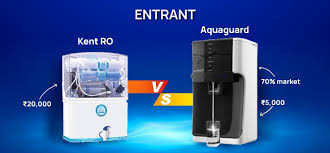
In terms of energy efficiency, Kent RO tends to consume more electricity due to its advanced filtration systems. However, it also provides more efficient water purification, especially in areas with high TDS. Aquaguard, especially in models with UV and UF filtration, uses less power and is more energy-efficient in the long term.
In terms of Kent vs aquaguard environmental impact, Aquaguard generally produces less water wastage, as its filtration methods don’t require as much water as RO systems. Kent RO, while efficient in purifying water, does produce more wastewater.
However, both brands have made strides to reduce their environmental footprint. When choosing the more sustainable option, Aquaguard might be the better choice for energy-conscious consumers, while Kent RO offers superior filtration, albeit with a slightly higher environmental cost.
Frequently Asked Questions about kent ro vs aquaguard
Is Aquaguard water better than RO?
Aquaguard and RO water purifiers are both effective, but they operate on different filtration technologies. Aquaguard uses a combination of UV, UF, and RO (sometimes) depending on the model, making it suitable for areas with microbial contamination.
Which brand is best for RO water?
Both Kent and Aquaguard offer good RO systems, but Kent RO is often considered the best when it comes to Reverse Osmosis filtration. Kent specializes in high-quality RO water purifiers with advanced filtration technologies and better mineral retention. Kent is often the preferred choice in areas where TDS levels are high, as it effectively removes dissolved salts and chemicals while retaining essential minerals.
Which is better, a water purifier or an RO?
Whether a water purifier or RO system is better depends on your water quality. A water purifier typically uses filtration methods like UV or UF, which are suitable for areas with microbial contamination but not effective for areas with high TDS. On the other hand, an RO system is ideal for removing dissolved salts, chemicals, and heavy metals, making it perfect for areas with hard or chemically contaminated water.
Is Kent a good brand for water purifiers?
Yes, Kent is a trusted and highly reputable brand for water purifiers. Known for its advanced RO technology, Kent provides excellent water purification systems that effectively remove harmful contaminants while retaining essential minerals. The brand is popular for its durable products and efficient performance. If you live in an area with high TDS, Kent is a reliable choice.
Is Aquaguard better than KENT?
The choice between Aquaguard and Kent depends on your specific needs. Aquaguard is known for providing effective filtration for microbial contamination, with options like UV and UF in addition to RO technology. It’s a good choice for areas with biological contaminants. Kent, however, specializes in advanced RO filtration, making it a better option for removing dissolved salts and chemicals, especially in areas with high TDS
Conclusion of Kent RO vs Aquaguard
In the Kent RO vs Aquaguard debate, both brands offer effective water purification solutions, but the best choice depends on your specific needs. Kent RO is ideal for urban areas with high TDS and chemical contamination, offering superior filtration technology that retains essential minerals.
However, it requires more maintenance and comes at a higher cost. Aquaguard, with its combination of UV, UF, and RO technologies, is better suited for areas with biological contamination and offers a more budget-friendly option. It is easier to maintain and provides quick solutions for general purification. In conclusion, if you need to address high TDS levels and require advanced purification, Kent RO is the better option.
But for affordability, ease of use, and microbial protection, Aquaguard might be the right choice for you. Ultimately, both brands provide reliable water purification, but the decision depends on your specific water quality and budget.
